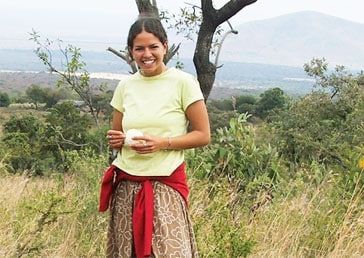

NEW YORK (WOMENSENEWS)–Female scientists working on some aspect of ecological conservation took three of this year’s five Wings WorldQuest Women of Discovery Awards, which will be given next week in a ceremony here at the Museum of Natural History.
"Conservation is an element in all of their work because the environment is under such stress worldwide," said Milbry Polk, director of Wings WorldQuest, which runs the awards. Polk is a Women’s eNews Leader for the 21st Century 2003.
Award recipients are nominated, vetted and selected by Wings WorldQuest’s international advisory board. The prizes are an outgrowth of Wings Trust, a New York-based nonprofit dedicated to recognizing the contributions of female scientists past and present.
Polk co-founded the trust in 1993 with the late Leila Hadley Luce, the widow of Henry Luce and a global-trotting travel writer who died in February 2009. The group’s 16-year-old mission continues.
"There is still a very big glass ceiling for women in science," Polk said. "You don’t find them in the history books. Women are left out. Their projects aren’t."
Polk plans to create an online archive of female explorers and scientists that have been left out of the history books. She says she has collected over 15,000 names from 2,000 years of women’s achievements, ranging from Egeria, who she says wrote the first guidebook to the Holy Land in 100 B.C. to Vera Ruben, who first shed light on dark matter in 1970. Polk is still searching for funding to launch this project.
Here are five more women Polk is likely to include in her ongoing preservation of women’s contributions to the most adventurous realms of science:
Field Research Award: Leela Hazzah (Egypt)
This doctoral candidate at the University of Wisconsin, Madison, specializes in conservation biology and sustainable development. She is also fluent in Kiswahili, a language spoken by Kenya’s legendary Masaai warriors, which has enabled her to link arms with the Masaai to protect cattle and lions alike. Since 2001, hunting and pesticide poisoning have killed 150 lions in the Amboseli-Tsavo ecosystem, endangering the species. In response, Hazzah conceived the Lions Guard, a community conservation project that trains Masaai communities to monitor the carnivores’ movements and prevent fatal clashes with humans or cattle. It is a turnaround for the Masaai, famed for their expertise in tracking and spearing lions, which can be part of a young man’s rite of passage and an act of revenge for livestock lost to the carnivore.
Humanity Award: Aparajita Datta (India)

For more than a decade, this senior scientist at the Conservation Foundation in Mysore, India, has been surveying and preserving the wildlife of Arunachal Pradesh, a high-altitude rainforest in northeast India. In expeditions that required leech-proof socks, Datta followed the tribal hunting trails of the native Lisu community and stumbled on two rare muntjac species–the leaf deer and the black barking deer–and a new monkey species. The hunting ground is now a natural reserve. Datta, who holds a doctorate in wildlife ecology, runs community development and wildlife preservation programs at the Namdapha National Park and the Pakke Wildlife Sanctuary.
Air and Space Award: Rosaly Lopes (Brazil)

This principal scientist at NASA’s jet propulsion lab and an investigator on the Cassini Radar Team, which observes Saturn, landed in the 2006 Guinness Book of World Records for her discovery of 71 new active volcanoes on Io, Jupiter’s sulfurous moon. Now Lopes has her eyes set on the volcanic features of Titan, the solar system’s second largest moon and the only one known to have an earthlike atmosphere, complete with clouds. A former astronomy student at the University of London, she is also the author of The Volcano Adventure Guide, the first travel guide to Earth’s active volcanoes.
Earth Award: Bolortsetseg Minjin (Mongolia)

One hundred million years ago the Gobi desert in Mongolia was a playing field for dinosaurs. Bolortsetseg Minjin now scans the same landscape for fossil records of the Cretaceous period. Paleontologists from outside her nation follow her tracks. Minjin has participated in and led several field trips for the Mongolian Academy of Sciences, the American Museum of Natural History, Georgia Southern University and the Museum of the Rockies. In one expedition, she found 67 dinosaur fossils in a single week. In 2007, she founded the nonprofit Institute for the Study of Mongolian Dinosaurs, in Ulaanbatar, to train the next generation of Mongolian paleontologists through collaboration with international scientists. She has a doctorate in paleontology from New York University and is doing post-doctoral work at Montana State University.
Sea Award: Maya Tolstoy (United States)

Ocean bottom seismometers, which measure movements in the Earth’s crust, and hydrophones, underwater microphones, make up Maya Tolstoy’s toolkit for researching the impact of tidal and seismic activity on the deepest ecosystems of the seafloor, which lie along the Mid-Ocean Ridge. More than 35,000 miles long, this underwater ridge is the world’s longest mountain range. In 2001 Tolstoy, a marine geophysicist at Lamont-Doherty Earth Observatory at Columbia University, joined a team of NASA scientists in the filming of "Aliens of the Deep," a deep-dive documentary directed by James Cameron, which explores marine life in the hydrothermal vents of the Mid-Ocean Ridge. Tolstoy has taken 27 data-collection voyages at sea and is widely published in science journals.
Dominique Soguel is Women’s eNews Arabic editor.
For more information:
Wings World Quest
http://www.wingsworldquest.org
Note: Women’s eNews is not responsible for the content of external Internet sites and the contents of Web pages we link to may change without notice.


